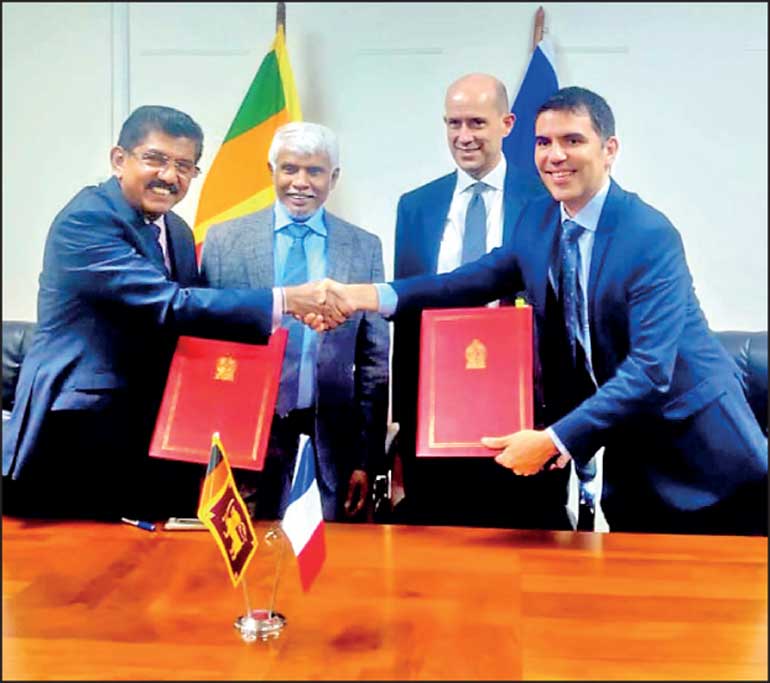Tuesday Feb 24, 2026
Tuesday Feb 24, 2026
Monday, 3 April 2023 00:06 - - {{hitsCtrl.values.hits}}

Environment Ministry Secretary Dr. Anil Jasinghe (left) and French Development Agency Country Director M. Reda Souirgi exchange the agreements in the presence of Environment Minister Naseer Ahamed and France Ambassador Jean-François Pactet
An agreement was signed last week between French Development Agency (AFD) Country Director M. Reda Souirgi and Ministry of Environment Secretary Dr. Anil Jasinghe, in the presence of Ambassador of France to Sri Lanka Jean-François Pactet and Minister of Environment Naseer Ahamed.
They signed a EUR 300,000 grant agreement supporting improved monitoring and reporting of air quality in Sri Lanka. The Central Environmental Authority (CEA) and National Building Research Organization (NBRO) officials were also present at the event.
Air pollution remains a critical issue for cities such as Colombo and Kandy, as for many other major cities in the developing world. In comparison to some of its regional counterparts such as Delhi and Dhaka, Sri Lanka still has a fairly good Air Quality Index. However, year on year it is evident that air quality is becoming a more prevalent issue. Each year, Sri Lanka suffers from seasonal air pollution events, generally imported from the Indian continent and exacerbated by its own pollution generating activities. The most recent being in January 2023, when NBRO declared dangerous levels of air quality in several parts of the country.
The COVID-19 travel restriction and the most recent fuel crisis in 2022 gave city dwellers a rare opportunity to witness their city with a high level of air quality and good breathable air.
Air quality is an important development indicator. Indeed, air pollution has high economic and social costs and overall impact on the general wellbeing and standard of living of city inhabitants. First, it comes with high human cost as it leads to higher cases of asthma, lung disease and various other respiratory diseases. This creates an economic burden on the health sector and reduces the overall productivity of the general population. Good air quality is also an important indicator of the attractiveness of a city, and boosting the overall competitiveness and image of a city in this global economy. Worldwide, the economic cost of air pollution is estimated $ 2.9 trillion per year (3.3% of world’s GDP), while it is linked to 4.5 million premature deaths annually.
Accordingly, the issue needs to be addressed in an objective and systematic way. Air pollution is not a new topic for Sri Lanka; far ahead of its regional counterparts, various indicators such as PM10, NOx, SOx, ozone and CO have been monitored for more than twenty years. Two new monitoring stations, managed by the CEA, were installed in 2019 near Colombo, at Battaramulla, and in Kandy. Meanwhile, monthly concentrations of NO2 and SO2 have been measured in 25, different places in and around Colombo, using passive sampling techniques by the NBRO. However, the country is still lacking consolidated data and facing discrepancies among different sources, preventing from accurate reporting and information dissemination.
Despite the existence of data sources, finding the Air Quality Index for Colombo remains particularly difficult, and the most frequently cited data are generally from unreliable sources. As such, accurate air monitoring and reporting is a critical first step to mitigate the negative impacts of air pollution, inform better policymaking and improve overall air quality of a city.
“With reliable information, and effective public communication on forecasts, the public can take appropriate preventative measures to protect themselves from pollution episodes (similar to that of weather forecasts). Likewise, reliable consistent data is critical in informing effective, data backed policies for air quality management, such as limiting vehicle movements during high pollution episodes, promoting non-motorized transport, transition to cleaner fuels, transition to new technologies (e-vehicles), etc.,” stressed M. Souirgi from the French Development Agency.
It is on this basis that AFD secured a grant fund of EUR 300,000 to develop an air quality monitoring project, through a technical partnership with AIRPARIF, the organisation responsible for monitoring air quality in Greater Paris.
“With almost 50 years of experience in air quality monitoring and forecasting, information to citizens, assessment of health risks and environmental impacts, and policy advisory on mitigation measures, AIRPARIF is well positioned to share its technical expertise with Sri Lanka, that is increasingly experiencing the negative effects of air pollution in its cities,” said French Ambassador Jean-François Pactet.
Capitalising on the French experience and expertise, the grant provided by AFD will facilitate the knowledge exchange with the Sri Lankan counterparts at the Central Environmental Authority and National Building Research Organization. The main objective will be to reinforce the existing local capacities to the set-up a systematic monitoring and reporting of air quality in Colombo metropolitan area.
It comes through improved maintenance of the existing monitoring network, improved data management, comprehensive census of pollution sources, identification of critical polluted areas where special strategies are needed, communication and awareness-raising of the general public on air quality. Over the long-term, the aim is to support Sri Lanka establish a centralised reporting mechanism for air quality monitoring, that can provide the basis for sound, effective data backed policy decisions.